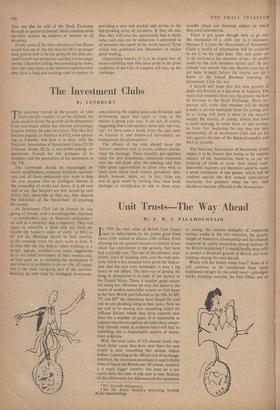The Investment Clubs
By LOTHBURY
?TINE post-war revival in the growth of Unit I Trusts in this country, it can be claimed, has done much to foster the growth of the Investment Club movement which has become increasingly popular during the past two years. The idea first became popular in America in 1951, soon spread- ing to Canada; and now it is here, with the National Association of Investment Clubs (25 / 29 Coleman Street, EC2), a non-profit-making or- ganisation, formed for the guidance of its members and the promotion of the movement in the UK.
The movement should be encouraged by senior stockbrokers, company directors, account- ants and all those enthusiasts who want to help the new investor take an intelligent interest in the ownership of stocks and shares. It is all very well to say that learners are best served by unit trusts; but, admirable as they are, they deprive the individual of the 'know-how' of investing his money.
An investment Club can be formed by any group of friends, with a knowledgeable chairman —a stockbroker, say, or financial statistician— as well as a secretary and a treasurer. They can agree to subscribe a fixed sum per head per month (by banker's order or cash); as little as £5 will do. Meetings should be held monthly in the evenings when the day's work is done. It is then that the fun begins; when working to a proper agenda, members can make suggestions as to the initial investment of their moneys and, as time goes on, to switching the investments if and when it is profitable to do so--for, of course, this is the most intriguing part of the exercise; building up your fund by intelligent investment,
consolidating the capital gains and dividends and re-investing again and again so long as the market is going your way. (I am not, of course, suggesting that stock markets move only one way, 'up'; we have seen a break from the past peak on January 6, and downward movements are testing times for all investors.) The officers of the club should show the `learner' members how to invest, without domin- ating the meetings. These monthly get-togethers make for new friendships, sometimes cemented over the odd drink after the meeting: and they offer great opportunities to those who wish to learn more about stock market procedure, divi- dends, bonuses, rights, etc. In fact, clubs can and do gain much by inviting their local bank manager or stockbroker to talk to them occa- sionally about any financial subject on which they need information.
There is not space enough here to go into the mechanics of a club; nor is it necessary, because if it joins the Association of Investment Clubs a wealth of information will be available to set it on the right lines. The only point yet to be resolved is the question of tax : do profits made by the club members attract tax? As yet, nobody can answer that one. No test case has as yet been brought before the courts, nor do 1 know of the Inland Revenue assessing an Investment Club for tax.
I believe and hope that this new growth of clubs will flourish as it has done in America. The more club members there are, the greater the flow of business to the Stock Exchange. More im- portant still, every club member will be taking a stake in private enterprise from his savings and in so doing will have a share in the nation's wealth. He should, of course, always first have a small nest-egg in some form of safe savings, so from that beginning he can step out into membership of an Investment Club and pit his wits against the best of the financial pundits and the City tycoons.
The National Association of Investment Clubs wishes it to be known that owing to the relative infancy of the Association, there is, as yet, no build-up of funds to cover their initial costs. Interested inquirers are therefore asked to make a small remittance of one guinea, which will be credited against the first annual subscription (normally five guineas) when the new club decides to become affiliated to the Association.






































 Previous page
Previous page